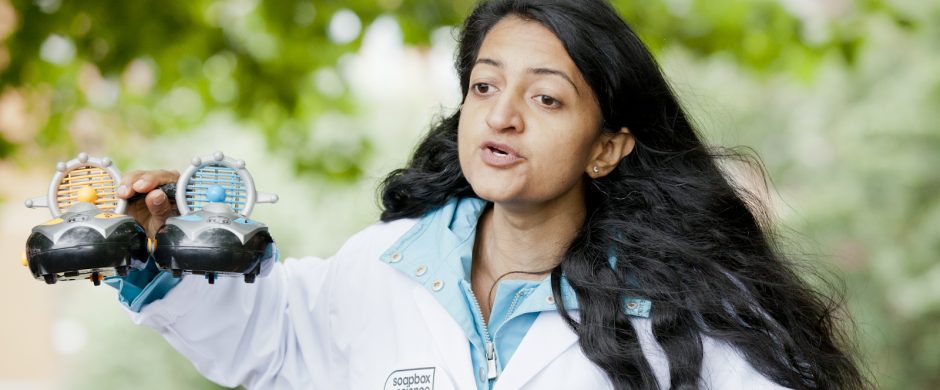 Jessica Brown is in her second year as a PhD student in the XM2 Metamaterials Centre of Doctoral Training at the University of Exeter, where she is working on a project on acoustic microfluidics and phononic crystals. Here she tells us how her passion for physical science led her to her current position and what inspires her to strive in her field. Hopefully you caught Jessica’s talk at Exeter’s 2018 Soapbox Science event on the 29th of September!
Jessica Brown is in her second year as a PhD student in the XM2 Metamaterials Centre of Doctoral Training at the University of Exeter, where she is working on a project on acoustic microfluidics and phononic crystals. Here she tells us how her passion for physical science led her to her current position and what inspires her to strive in her field. Hopefully you caught Jessica’s talk at Exeter’s 2018 Soapbox Science event on the 29th of September!
SS: How did you get to your current position?
JB: Funnily enough, it all started when I was offered a place on a Graduate Business Partner internship at Exeter University – I had been working in a shoe shop back home for a few months after I finished my MPhys Physics with Astrophysics degree (also at Exeter), during which I’d been applying unsuccessfully for graduate schemes and PhD positions, mostly in astrophysics. The University Career Zone rang me up to suggest that I apply for the internship to help me into graduate level employment, and I was offered the role. Our team’s project looked at how well taught undergraduate modules aligned with the University’s overall Education Strategy, and as part of that we met module leaders to discuss their module content, assessment and teaching. I actually ended up meeting my now-supervisor who runs the Natural Sciences course here, and after he found out I was a Physics graduate, he asked if I would be interested in a PhD project with him. I had always wanted to do a PhD but never really had a break, so I jumped at the opportunity! I feel like I’ve taken a big risk switching from astrophysics and joining the XM2 Metamaterials Centre of Doctoral Training – people tend to have more practical backgrounds like experimental physics or engineering, or something similar to their PhD project – but I’m learning so many new skills and now my research feels more relevant to the real world. Having said all this, I always find it funny to think about how I wouldn’t be here now if I hadn’t worked in that shoe shop!
SS: What, or who, inspired you to get a career in science?
JB: I had always had a strong interest in science from a young age, but it really boils down to my teachers at school. Towards the end of my time at primary school, I had the most inspiring science teacher who really instilled my love of physical science, so my (slightly meandering!) journey towards a physics PhD is almost certainly thanks to him. My love of astronomy in particular was motivated by my GCSE Physics teacher, who had a very engaging approach to the topic I eventually concentrated on at university. Meeting my supervisor as an intern was also really inspiring, especially seeing his enthusiasm for what is now my research – this convinced me to change directions, and now working with him and the wider research group is fantastic!

A snippet from Jessica’s day: Finite-element modelling of surface acoustic wave streaming using COMSOL Multiphysics.
SS: What is the most fascinating aspect of your research/work?
JB: I’m still fairly early on in my project, so I’ve been concentrating on computational simulation and modelling so far with a little experimental work. At the moment, I’m still trying to get up to speed with the field! I suppose what I’m most excited about is the number of directions in which we could possibly go with it – I’ve had a lot of time to read lots of interesting papers about potential applications, which include things like biomedical diagnosis. If my research could be used to help people with illnesses, that would be very fulfilling for me.
SS: What attracted you to Soapbox Science in the first place?
JB: I was pointed towards the scheme by a previous participant in the CDT who said it was a great experience – it looks like a great way to introduce the public to interesting science, while simultaneously promoting female scientists. I also feel it’s very easy to get bogged down in your research, so taking a step back to think about it from the point of view of someone without a scientific background is a useful exercise.
SS: Sum up in one word your expectations for the day
JB: Outreach.
SS: If you could change one thing about the scientific culture right now, what would it be?
JB: I feel that the world of science is extremely competitive, which can be a good thing in terms of making fast progress in research, but at the same time it can be quite a daunting world to enter – I’m only at the beginning of my career (possibly even before it!) and I worry sometimes about being able to make my mark on my field of research.

Jessica explaining her research to other XM2 post-graduate researchers.
SS: What would be your top recommendation to a woman studying for a PhD and considering pursuing a career in academia?
JB: I definitely recommend surrounding yourself with a supportive network of other scientists (both female and male) and sticking to your guns – “imposter syndrome” is real, and you always know more than you think you do!
